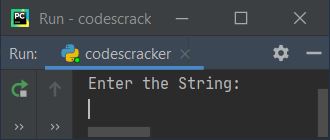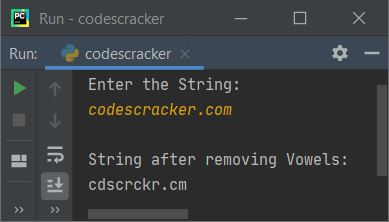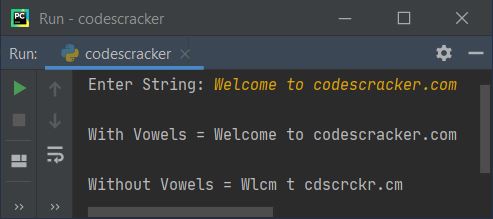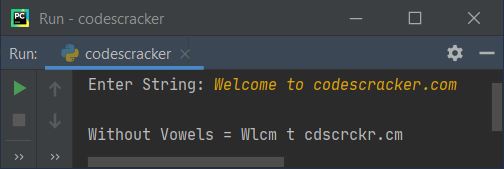- Python Basic Programs
- Python Program Examples
- Python Print Hello World
- Python Get Input from User
- Python Add Two Numbers
- Add Subtract Multiply Divide
- Python Check Even or Odd
- Python Check Prime or Not
- Python Check Alphabet or Not
- Python Check Vowel or Not
- Python Check Leap Year or Not
- Check Reverse equal Original
- Check Positive Negative Zero
- Python Check Armstrong or Not
- Python Check Palindrome or Not
- Python Check Perfect Number
- Python Find Reverse of Number
- Python Count Digits in Number
- Python Add Digits of Number
- Sum of First and Last Digits
- Python Product of Mid Digits
- Sum of Squares of Digits
- Interchange Digits of Number
- Python Sum of n Numbers
- Python Print ASCII Values
- Python Swap Two Numbers
- Python Swap Two Variables
- Python Fahrenheit to Celsius
- Python Celsius to Fahrenheit
- Python Display Calendar
- Python Days into Years, Weeks
- Find Largest of Two Number
- Find Largest of Three Number
- Python Print Fibonacci Series
- Generate Armstrong Numbers
- Python Make Simple Calculator
- Python Add Binary Numbers
- Binary Number Multiplication
- Python Mathematical Programs
- Find Sum of Natural Numbers
- Find Average of n Numbers
- Python Print Multiplication Table
- Print Table using Recursion
- Python Find Average Percentage
- Python Find Grade of Student
- Find Square Root of Number
- Python Print Prime Numbers
- Find Numbers Divisible by
- Python Find Factors of Number
- Python Find Factorial of a Number
- Python Find HCF & LCM
- Python Kilometres to Miles
- Python Find Area of Square
- Python Find Area of Rectangle
- Python Find Area of Triangle
- Python Find Area of Circle
- Python Find Perimeter of Square
- Find Perimeter of Rectangle
- Python Find Perimeter of Triangle
- Find Circumference of Circle
- Python Simple Interest
- Python Solve Quadratic Equation
- Python Different Set of Operations
- Python Display Powers of 2
- Python Find nCr & nPr
- Python Pattern Programs
- Python Print Pattern Programs
- Python Print Diamond Pattern
- Python Print Floyd's Triangle
- Python Print Pascal's Triangle
- Python List Programs
- Python Count Even/Odd in List
- Python Positive/Negative in List
- Python Even Numbers in List
- Python Odd Numbers in List
- Python Sum of Elements in List
- Sum of Odd/Even Numbers
- Python Element at Even Position
- Python Element at Odd Position
- Python Search Element in List
- Python Largest Number in List
- Python Smallest Number in List
- Python Second Largest in List
- Python Second Smallest in List
- Python Insert Element in List
- Python Delete Element from List
- Python Multiply Numbers in List
- Swap Two Elements in List
- Python 1D Array Program
- Python Linear Search
- Python Binary Search
- Python Insertion Sort
- Python Bubble Sort
- Python Selection Sort
- Remove Duplicates from List
- Python Reverse a List
- Python Merge Two List
- Python Copy a List
- Python Conversion Programs
- Python Decimal to Binary
- Python Decimal to Octal
- Python Decimal to Hexadecimal
- Python Binary to Decimal
- Python Binary to Octal
- Python Binary to Hexadecimal
- Python Octal to Decimal
- Python Octal to Binary
- Python Octal to Hexadecimal
- Python Hexadecimal to Decimal
- Python Hexadecimal to Binary
- Python Hexadecimal to Octal
- Python Matrix Programs
- Python Add Two Matrices
- Python Subtract Two Matrices
- Python Transpose Matrix
- Python Multiply Matrices
- Python String Programs
- Python Print String
- Python Find Length of String
- Python Compare Two Strings
- Python Copy String
- Python Concatenate String
- Python Reverse a String
- Python Swap Two Strings
- Python Uppercase to Lowercase
- Python Lowercase to Uppercase
- Python Check Substring in String
- Python Count Character in String
- Count Repeated Characters
- Python Count Word in Sentence
- Python Count Each Vowels
- Python Capitalize Character
- Python Capitalize Word in String
- Python Smallest/Largest Word
- Remove Spaces from String
- Remove Duplicate Character
- Remove Vowels from String
- Remove Punctuation from String
- Python Remove Word in String
- Python Remove Duplicate Words
- WhiteSpace to Hyphens
- Replace Vowels with Character
- Replace Character in String
- Python Sort String in Alphabetical
- Sort Word in Alphabetical Order
- Extract Number from String
- Python Check Anagram Strings
- Python File Programs
- Python Read a File
- Python Write to File
- Python Append Text to File
- Python Copy Files
- Python Merge Two Files
- Python Counts Characters in File
- Python Count Words in File
- Python File Content in Reverse
- Python Lines Contains String
- Python Delete Line from File
- Python Capitalize Word in File
- Python Replace Text in File
- Replace Specific Line in File
- Python Find Size of File
- Python List Files in Directory
- Python Delete Files
- Python Misc Programs
- Python Reverse a Tuple
- Python Merge Two Dictionary
- Python bytes to String
- Python bytearray to String
- Generate Random Numbers
- Python Print Address of Variable
- Python Print Date and Time
- Python Get IP Address
- Python Shutdown/Restart PC
- Python Tutorial
- Python Tutorial
Python Program to Remove Vowels from String
This article is created to cover some programs in Python, that removes vowels from a string entered by user. Here are the list of approaches used:
- Remove vowels from a string using for loop
- Using string slicing
- Using replace() method
Note - a, e, i, o, u, A, E, I, O, U are all vowels.
Remove Vowels from String using for Loop
To remove all vowels from a string in Python, you have to ask from user to enter a string, then remove all vowels from it as shown in the program given below. The question is, write a Python program to remove vowels from string. Here is its answer:
print("Enter the String: ") text = input() vowels = ['a', 'e', 'i', 'o', 'u', 'A', 'E', 'I', 'O', 'U'] newtext = "" textlen = len(text) for i in range(textlen): if text[i] not in vowels: newtext = newtext + text[i] print("\nString after removing Vowels: ") text = newtext print(text)
Here is the initial output produced by this Python program:

Now supply the input say codescracker.com and press ENTER key to remove all vowels from this
string and print new string without vowel as shown in the snapshot given below:

The above program works in a way that:
- I've created a list of all 10 vowels. 5 lowercase and 5 uppercase vowels
- Then initializes characters, one by one to a new string say newtext, only if character (that is going to initialize) does not present in (or equal to) any of 10 vowels available in the list
Note - The len() method returns length of string passed as its argument.
Note - The range() method returns a sequence of values. By default, starts with 0 and increments by 1 each time. Continues until the value provided as its argument.
The dry run of above program with user input codescracker.com goes like:
- Initial values, text = "codescracker.com" (entered by user), newtext = "", and textlen = 16 (since length of given string is 16)
- Now the execution of for loop begins, that is initially i=0 and since 0 is less than textlen or 16, therefore condition evaluates to be true, and program flow goes inside the loop
- The condition (of if) text[i] not in vowels or text[0] not in vowels or "c" not in vowels evaluates to be true, because "c" is the character that does not available in the list named vowels. Therefore program flow goes inside this if's body and newtext + text[i] or "" + text[0] or "" + "c" or "c" gets initialized to newtext
- Now the value of i gets incremented, so i=1, since 1 is again less than 16, therefore condition again evaluates to be true, therefore program flow again goes inside the loop
- This time, text[i] not in vowels or text[1] not in vowels or "o" not in vowels evaluates to be false, since "o" is the character that is available in the list named vowels. Therefore program flow doesn't goes inside the if's body
- Now i=2 and this time, the condition of if, that is text[i] not in vowels or text[2] not in vowels or "d" not in vowels evaluates to be true, therefore newtext + text[i] or "c" + "d" or "cd" gets initialized to newtext
- This process continues, until the value of i becomes 16
- In this way, the variable newtext holds the string value entered by user, but without any vowels
- So, initialized its value to text and the value of text gets printed as string without vowels
Modified Version of Previous Program
This is the modified version of previous program. This program uses for loop in a way that, each and every characters of string gets copied to c one by one, and using c's value, I've checked and does the job of removing vowels just like previous program. The only difference is c is treated as text[i] here.
print("Enter String: ", end="") text = input() vowels = ['a', 'e', 'i', 'o', 'u', 'A', 'E', 'I', 'O', 'U'] newtext = "" for c in text: if c not in vowels: newtext = newtext + c print("\nWith Vowels =", text) text = newtext print("\nWithout Vowels =", text)
Here is its sample run with string input Welcome to codescracker.com:

Note - The end= is used to skip inserting newline using print()
Remove Vowels from String using String Slicing
This program uses string slicing to do the job of removing vowels from a string. This program removes vowels from string without using any other (second) variable.
print("Enter String: ", end="") text = input() vowels = ['a', 'e', 'i', 'o', 'u', 'A', 'E', 'I', 'O', 'U'] i = 0 for c in text: if c in vowels: text = text[:i] + text[i+1:] i = i-1 i = i+1 print("\nWithout Vowels =", text)
Here is its sample run with same string input as previous sample run:

In above program, the following statement:
text = text[:i] + text[i+1:]
states that, except character at ith index, all characters before and after ith index, gets added and initialized to text as its new value.
Note - While slicing string using index pairs inside square brackets, that is [:], index number before colon is included, and index number after colon is excluded.
Note - Empty before : (colon) in [:] refers to 0, and empty after : (colon) in [:] refers to the length value of string.
Remove Vowels from String using replace()
This program uses replace() method to replace the vowel with nothing (""). So that, one by one all vowels gets removed with "", that is empty. Let's have a look at the program
print("Enter String: ", end="") text = input() vowels = ['a', 'e', 'i', 'o', 'u', 'A', 'E', 'I', 'O', 'U'] for c in text: if c in vowels: text = text.replace(c, "") print("\nWithout Vowels =", text)
Same Program in Other Languages
« Previous Program Next Program »